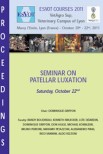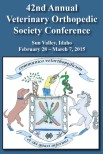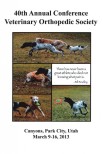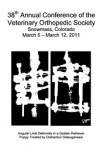OBJECTIVE: To investigate the presence or absence of Toll-like receptor (TLR)-2 and TLR-4 in synovial tissues collected from stifle joints (SJs) of dogs with or without osteoarthritis. ANIMALS: 21 purpose-bred research dogs, 3 client-owned dogs with SJ osteoarthritis, and 3 dogs without SJ osteoarthritis. PROCEDURES: Research dogs underwent arthroscopic surgery in 1 SJ to induce osteoarthritis via cranial cruciate ligament transection (CrCLt; n = 5), femoral condylar articular cartilage groove creation (6), or release of the caudal horn of the medial meniscus (5); 5 dogs underwent sham surgery. Synovial tissue specimens were obtained from both stifle joints of each dog 12 weeks after surgery, and TLR-2 and TLR-4 gene expression were determined via real-time reverse transcription PCR assays. Expression of TLR-4 protein was determined via an immunofluorescence technique in additional specimens obtained from osteoarthritic SJs of dogs with cranial cruciate ligament insufficiency and from dogs with nonosteoarthritic SJs. RESULTS: Synovial tissues from CrCLt-treated joints had significantly higher TLR-4 gene expression, compared with the contralateral control SJs or any other joint group. TLR-2 gene expression did not differ significantly among groups. Toll-like receptor-4 protein was detected in synovial tissues of osteoarthritic SJs but was rarely evident in nonosteoarthritic SJs. CONCLUSIONS AND CLINICAL RELEVANCE: Increased TLR-4 gene expression in the synovial tissue of SJs with osteoarthritis secondary to CrCLt suggests that activation of innate immunity may play a role in the pathophysiology of SJ osteoarthritis in at least a subset of dogs.
Expression of Toll-like receptors 2 and 4 in stifle joint synovial tissues of dogs with or without osteoarthritis.
Date
2010 Jul
Journal
AJVR
Volume
71
Number
7
Pages
750-4









